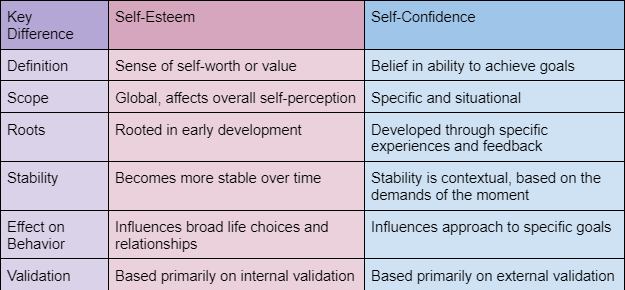In the search for meaning and self-awareness, we all have felt moments where we doubt ourselves or our abilities. This doubt limits our self-esteem and hampers our confidence when we need it most. But when understanding ourselves, what is the difference between esteem and confidence?
Self-esteem refers to our intrinsic self-worth and value, an emotional assessment of our dignity. In contrast, self-confidence refers to our belief in our abilities to perform tasks, face challenges, and achieve goals. In other words, self-esteem refers to overall feelings of worth, while self-confidence refers to faith in our competence.
Recognizing and internalizing the nuances between these two concepts can be transformative. By understanding where our feelings of worth originate and how our beliefs in our abilities manifest, we can begin to nurture each aspect of ourselves appropriately.
This article will explore these concepts, how they differ, and practical tips for building self-esteem and confidence.
What is Self-Esteem?
Self-esteem refers to an individual’s sense of their value in the world. Overall, it’s an evaluation of one’s worthiness based on internal beliefs about ourselves.
Self-esteem is intrinsic, meaning it can only come from ourselves. It determines how much individuals believe they are valued, loved, and accepted by others and how much they value themselves.
While influenced by outside factors, no one else can determine your self-worth but you. When you rely on others’ interpretations of your worth, you limit your ability to live a fulfilling life and depend on others for support and motivation.
Self-esteem is generally rooted in childhood experiences, including feedback from parents, teachers, and peers. Initially dependent, children learn to become independent by seeing themselves as separate and unique due to this feedback.
Individuals with poor models for self-esteem as children may have never learned to become fully self-reliant, leading to doubt in themselves or dependence on others for esteem. However, with appropriate counseling, individuals can grow their self-esteem and personal values.
For those who build their self-esteem, it offers more confidence, optimism, and love for oneself. Individuals with low self-esteem may avoid challenges, fear failure, experience inadequacy, and are more susceptible to mental health conditions.
What is Self-Confidence?
Self-confidence refers to an individual’s belief in their abilities to achieve desired outcomes, perform tasks, or handle various situations. It’s about having faith in one’s competence.
Unlike self-esteem, which is more stable and encompassing, self-confidence is generally situational. For example, regardless of one’s esteem, one may feel confident in drawing or performing music but not confident in social situations or public speaking.
For everyone, confidence depends on the context and specific skill set involved. Further, everyone is confident in some areas but not in others. Confidence only refers to belief in achieving a goal based on prior experience and perceived competence.
While childhood experiences can bolster confidence, generally, it’s built throughout each person’s life based on positive experiences, feedback, and successes. In the same way, individuals can lose confidence based on negative experiences and feedback.
Individuals with high self-confidence are likelier to set ambitious goals, take risks, and accept criticism. Their belief in their abilities allows them to overcome challenges and meet realistic goals.
The Interplay Between Self-Esteem and Self-Confidence
Self-esteem and self-confidence refer to how we value ourselves (esteem) and our ability to achieve goals (confidence). While distinct, they often work together to provide fulfillment in our lives and allow us to achieve the goals we set out for.
In many ways, these two concepts are mutually reinforcing. Achieving success in tasks can boost your overall self-esteem. On the flip side, when you have a foundation of high self-esteem, you’re more likely to take risks or try new things.
Additionally, self-esteem can act as a buffer to failure when trying new things, allowing individuals to handle setbacks more effectively. Even if their confidence is shaken, their self-worth remains stable.
For individuals with low self-esteem, excelling in tasks they are confident in can provide a niche of positivity and pride, allowing them to learn the foundations of self-esteem within this area.
While distinct, self-esteem and self-confidence work together to influence and shape our self-awareness and value beliefs.
Key Differences Between Self-Esteem and Self-Confidence
Overall, the main difference between the two concepts is that self-esteem is global, affecting the entire individual’s self-worth, while self-confidence is contextual, relating to specific situations.
Another way to view this is that self-esteem involves beliefs about our values, while self-confidence refers to beliefs about our abilities.
To help demonstrate these differences, the graph below represents specific aspects that distinguish self-esteem from self-confidence.
Practical Tips for Building Self-Esteem and Self-Confidence
In today’s fast-paced world, it’s easy for individuals to feel lost and out of touch with their self-worth.
However, with intentional effort, one can cultivate their self-esteem and self-confidence. Both are vital for personal growth, resilience, and overall well-being.
The best results come with consultation with a licensed therapist who can help you navigate this process and provide context for the changes you experience. They can meet with you, evaluate your current status, and offer strategies to build esteem and confidence.
Building Self-Esteem
High self-esteem fosters positivity, adaptability, and a proactive approach to challenges. Here are some practical strategies to strengthen your self of self-worth:
- Reflect on Your Positive Qualities: Make a list of your strengths, accomplishments, and things you like about yourself. Revisit this list often and add to it as you recognize more of your unique qualities.
- Practice Self-Compassion: Be kind to yourself. Speak to yourself as you would to a close friend, with understanding, patience, and encouragement.
- Challenge Negative Thoughts: Pay attention to critical or unhelpful thoughts about yourself. Challenge those thoughts and replace them with positive narratives.
- Surround Yourself With Positive Influences: Spend time with people who uplift and appreciate you.
- Avoid Negative Comparisons: Everyone is on their own journey. Comparing yourself to others can hurt your self-esteem. Instead, focus on your own path.
- Set Boundaries: Learn to say no and ensure that your boundaries are respected. This action reinforces the belief that your feelings and needs are valid.
- Seek Professional Help: If low self-esteem is affecting your mental health or daily life, consider therapy or counseling. Professionals can provide valuable tools and insights to boost self-esteem.
Cultivating Self-Confidence
Cultivating self-confidence is a cornerstone for personal development, enabling individuals to approach challenges enthusiastically and take appropriate risks without fear.
Like building muscles, fostering self-confidence is an ongoing process that requires practice, persistence, and patience.
Here are some suggestions to improve and sustain one’s self-confidence:
- Start Small and Build Up: Begin with tasks you’re familiar with and gradually tackle bigger challenges. Each success, no matter how minor, can boost your confidence.
- Celebrate Your Achievements: Take time to acknowledge and rejoice in your accomplishments, big or small.
- Embrace Continuous Learning: Seek opportunities to gain new skills or enhance existing ones.
- Accept Constructive Criticism: Use feedback as a tool for growth. Constructive criticism can show areas for improvement, which can build confidence.
- Visualize Success: Imagining a positive outcome can reduce anxiety and bolster self-assurance.
- Face Your Fears: Confront what you fear head-on. With each challenge you face, your confidence in handling similar situations in the future will grow.
- Work With a Therapist: If you’re considering ways to boost your confidence, a professional therapist is expert in strategies and tools to help you realize your true competence.
Begin Your Journey to Self-Improvement Today with Start My Wellness
Building a foundation of self-esteem and self-confidence is an empowering journey that can radically enhance one’s life. This path of self-discovery and self-improvement, though challenging, is rewarding in countless ways.
With each step, individuals pave the way to realizing their true potential and unlocking a life of greater fulfillment, happiness, and success.
Start My Wellness understands the intricacies of this journey. Our team of trained professionals and therapists is dedicated to guiding individuals on this path, offering personalized strategies, insights, and support. With a holistic approach, we focus on both the emotional and practical aspects of building self-esteem and confidence.
Remember, the journey to self-improvement is continuous, and every step, no matter how small, brings you closer to the best version of yourself. Reach out to Start My Wellness today at 248-514-4955 to begin your transformative journey.
Sources

Author: Anton Babushkin, PhD
Looking for a Therapist? Start My Wellness has highly experienced Licensed Therapists that are currently accepting new patients.



